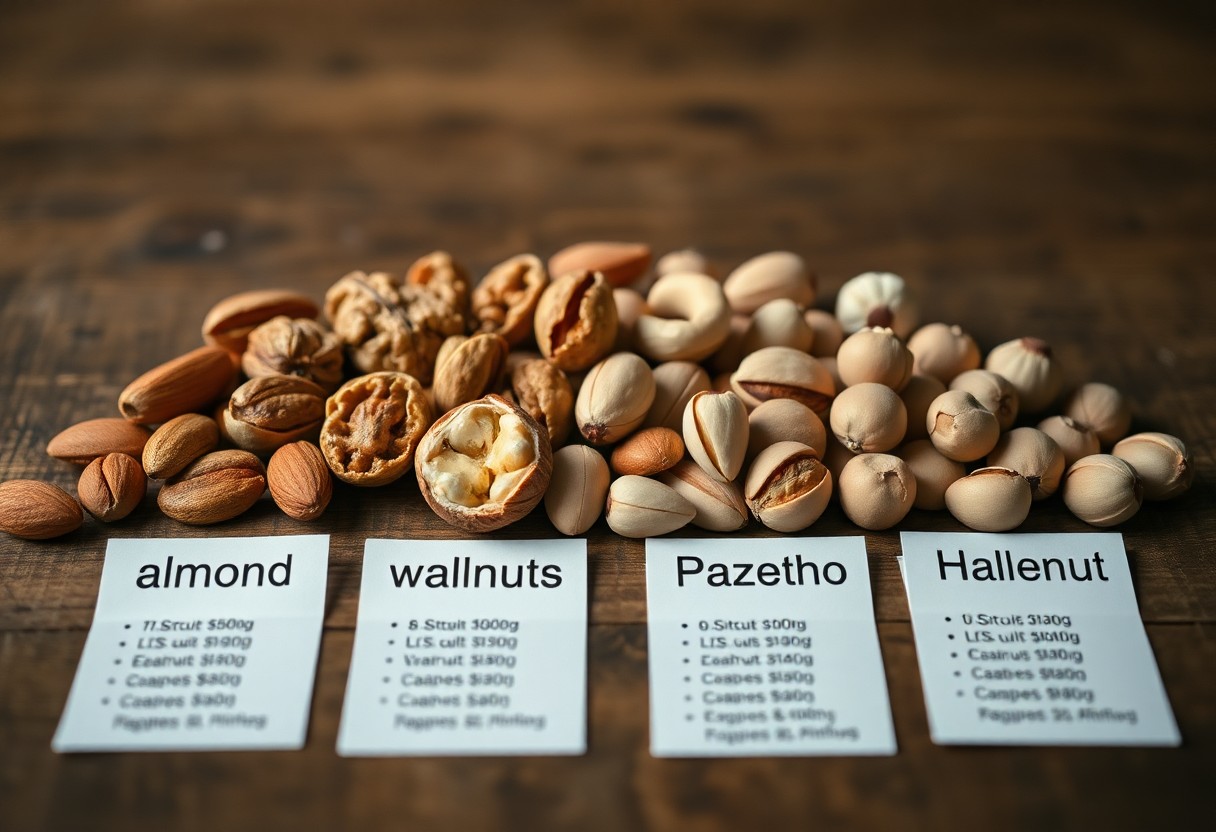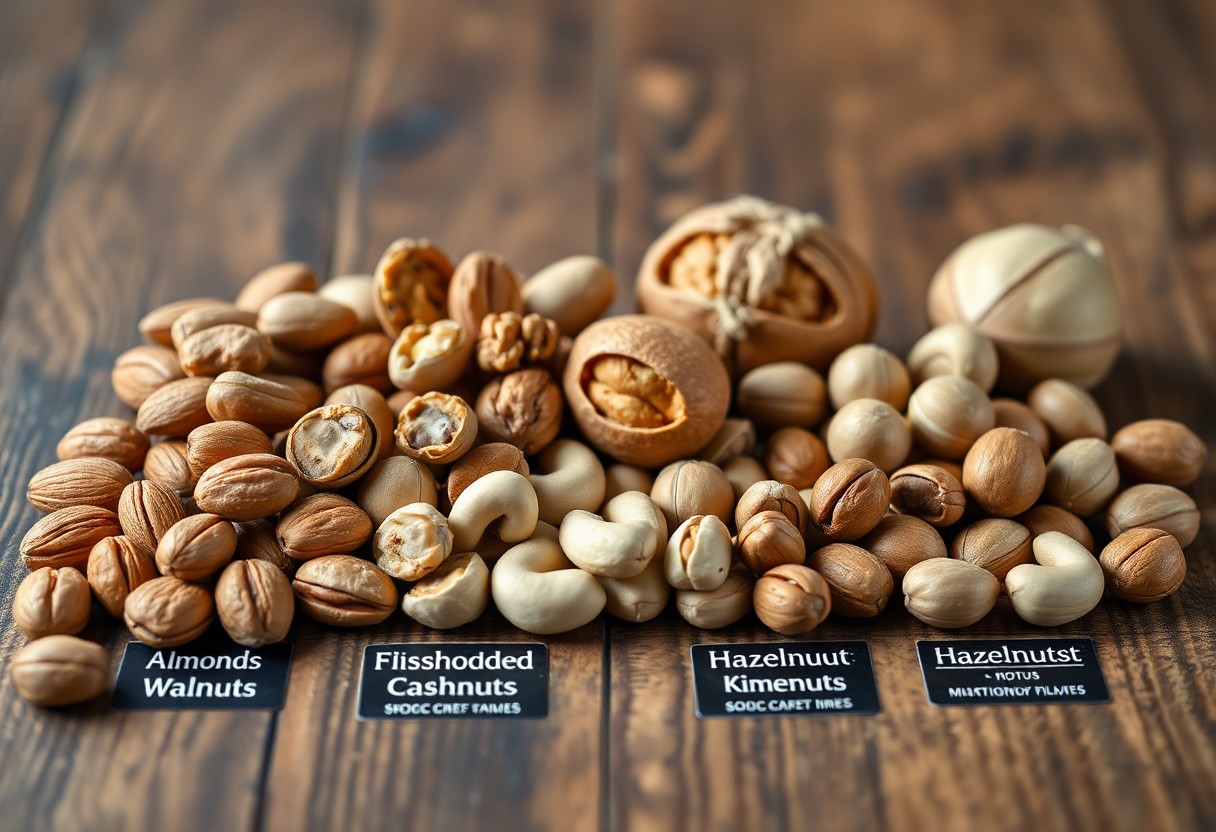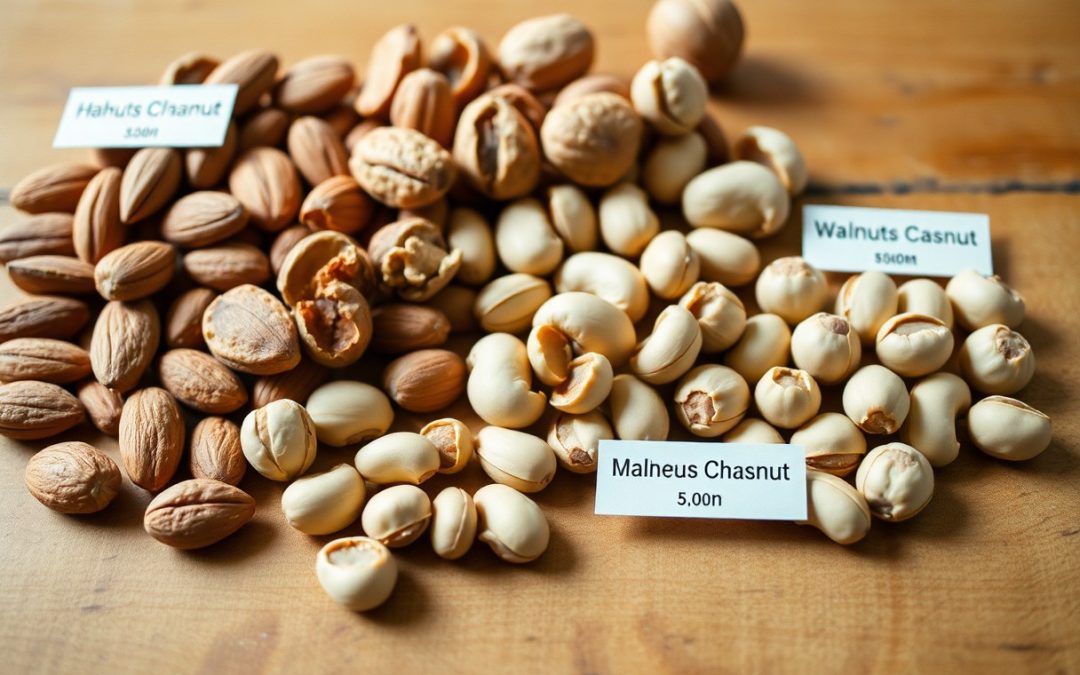Wellness is deeply intertwined with the foods you choose, and nuts are a powerhouse of nutrition that can significantly enhance your diet. Packed with healthy fats, protein, vitamins, and minerals, these small but mighty snacks offer a variety of benefits for your overall health. Understanding the unique nutritional profiles of different nuts can empower you to make choices that align with your wellness goals, whether you seek heart health, weight management, or antioxidant support.

Overview of Nut Varieties
Your journey to optimal wellness can be enriched by including various nut varieties in your diet. Each type offers distinct flavors and unique health benefits, providing your body with imperative nutrients and energy. From protein to healthy fats, nuts are not only delicious but also a smart choice for enhancing your overall well-being.
Almonds
About almonds, they stand out as the highest in fiber compared to other nuts. Rich in vitamin E, magnesium, and calcium, almonds play a vital role in supporting immune function and assisting in energy production. Their antioxidant properties may even improve muscle recovery after exercise, making them a versatile snack choice.
Walnuts
Varieties of walnuts are noted for their unique content of omega-3 fatty acids, making them a excellent choice for those wanting to support their cardiovascular and brain health. With just 2 grams of net carbohydrates per serving, walnuts align well with ketogenic diets while also contributing to mood enhancement and cognitive function.
Indeed, walnuts are one of the best plant-based sources of omega-3s, with 2.57 grams per ounce. Studies suggest that regular walnut consumption may reduce inflammation and oxidative stress, promoting better brain function and a lower risk of heart disease. Incorporating walnuts into your meals—such as salads or trail mix—can significantly elevate your nutritional intake.
Pistachios
For those seeking a lower-calorie nut option, pistachios provide a flavorful alternative while being lower in fat. Their beneficial nutrients, including potassium and plant compounds, contribute to overall wellness and reduced inflammation. Enjoying them can support weight management, especially when consumed in moderation.
To maximize the benefits of pistachios, consider shelling them yourself, as this can promote mindful eating and slow down your snacking process. Studies indicate that this method may aid in weight loss by limiting consumption and increasing awareness of portions. Adding pistachios to yogurt, salads, or snacks can enhance your diet significantly.
Nutritional Profiles
Even though all nuts share a wealth of dietary benefits, each nut boasts a unique nutritional profile that can best serve your specific wellness goals. Almonds are high in fiber, vitamin E, magnesium, and calcium; walnuts shine with their omega-3 fatty acids; and pistachios offer a lower calorie option packed with antioxidants. By selecting a variety of nuts, you can optimize your nutrient intake and enjoy the diverse benefits each type provides.
Macronutrients
Between almonds, walnuts, and pistachios, you’ll find a balanced mix of healthy fats, protein, and carbohydrates tailored to different needs. Almonds are high in fiber and protein, while walnuts provide beneficial omega-3 fats. Pistachios, on the other hand, deliver a lower calorie option, making them ideal for those watching their intake.
Micronutrients
By examining the micronutrient content, you can better understand how each nut contributes to your overall wellness. Almonds excel in vitamin E and magnesium, while walnuts are abundant in antioxidants. Pistachios offer potassium and other plant-based compounds that help reduce inflammation.
And, exploring the specific micronutrients in each nut reveals how they can enhance your daily nutrient intake. For instance, vitamin E in almonds can support immune function, while the potassium in pistachios promotes heart health. Walnuts’ omega-3 fats are linked to improved brain health, making each nut a valuable addition to your diet for optimal wellness.
Health Benefits of Nuts
Keep incorporating a variety of nuts into your diet to unlock numerous health benefits. Nuts are a powerhouse of nutrients, rich in healthy fats, plant-based protein, fiber, vitamins, and minerals. Regular consumption can enhance immune function, support heart health, and even improve mood, making them an optimal choice for your wellness journey.
Heart Health
On top of their nutritional benefits, nuts can significantly improve heart health. Studies have shown that including nuts, particularly walnuts, in your diet can lower bad LDL cholesterol, reduce inflammation, and support arterial health, decreasing your risk of heart disease.
Brain Health
On your journey to better cognitive function, walnuts stand out as one of the best options. Rich in omega-3 fatty acids, they contribute to brain health by possibly reducing inflammation and oxidative stress. Regular consumption of walnuts may protect against cognitive decline and improve mood, making them an excellent addition to your diet.
Heart-healthy omega-3 fatty acids found in walnuts are linked to enhanced brain health. Research indicates that these healthy fats can positively influence mood and cognitive performance, potentially shielding you from age-related mental decline. Integrating walnuts into your daily routine can help you support both your heart and brain, promoting overall well-being.
Weight Management
Along with their other benefits, nuts can aid in weight management. Pistachios, for example, are lower in calories compared to other nuts, and their shelling process can slow down your eating, helping you control portion sizes while still feeling satisfied.
At the same time, incorporating nuts into your meals can ensure you feel fuller longer due to their fiber and protein content. This satiety can help prevent overeating and assist in maintaining or losing weight more effectively. With their rich nutrient profile, nuts are a delicious and healthy choice for those looking to manage their weight.
Antioxidant Properties
Despite the common perception that fruits and vegetables are the primary sources of antioxidants, nuts play a significant role in your diet by providing these important compounds. Almonds, walnuts, and pistachios each contain unique antioxidants that contribute to reducing oxidative stress in your body, promoting overall well-being. Regular consumption of these nuts can enhance your body’s defenses against free radicals, potentially lowering your risk of chronic diseases.
Comparison of Antioxidants
Antioxidant Content in Nuts
| Nuts | Type of Antioxidant |
|---|---|
| Almonds | Vitamin E, flavonoids |
| Walnuts | Melatonin, polyphenols |
| Pistachios | Lutein, beta-carotene |
Role in Disease Prevention
Role of antioxidants in your diet cannot be overstated, as they help neutralize harmful free radicals that contribute to various diseases. Including a variety of nuts in your meals ensures you get a broad spectrum of antioxidants, which may help in lowering the risk of conditions like heart disease and cancer.
Even moderate consumption of nuts rich in antioxidants, such as walnuts or pistachios, has been linked to better cardiovascular health and a reduced risk of cognitive decline. Incorporating these nuts into your daily routine can fortify your defense against oxidative stress, supporting your body in combating inflammation and improving your overall well-being.

Incorporating Nuts into Your Diet
All nuts offer versatile ways to enhance your meals and snacks, making it easy to incorporate them into your daily routine. You can sprinkle almonds on your salad, blend walnuts into smoothies, or enjoy pistachios as a satisfying on-the-go snack. Aim for a variety of nuts to receive diverse nutritional benefits, including fiber, plant-based protein, and healthy fats that can contribute to improved health outcomes.
Serving Suggestions
At breakfast, you can add chopped nuts to yogurt or oatmeal, while at lunch, sprinkle some over your favorite salads for added crunch. For dinner, you might incorporate nuts into stir-fries or grain dishes for an extra layer of flavor. Nut butter spreads are also a fantastic option for snacks or as part of a healthy dessert.
Portion Control
The right portion size is key to enjoying the benefits of nuts without exceeding your caloric needs. Although nuts are nutrient-dense, their higher calorie content can add up quickly if you are not mindful. A recommended serving size is typically about 1 ounce, which equates to around a small handful. This allows you to include them in your diet without compromising your health goals.
Even when nuts are rich in nutrients, practicing portion control is important for maintaining a balanced diet. Overeating even healthy foods can lead to weight gain or disrupt your body’s nutrient balance. To manage your intake, consider pre-portioning nuts into small bags or containers. This not only helps you enjoy their delicious flavors but also assists in keeping your snacking habits aligned with your dietary ambitions.
Potential Allergies and Considerations
Not everyone can enjoy the benefits of nuts, as nut allergies can pose serious health risks for some individuals. Common nut allergies include reactions to peanuts, tree nuts like almonds, walnuts, and pistachios, leading to symptoms that range from mild oral discomfort to severe life-threatening conditions such as anaphylaxis.
Nut Allergies
About 1% of the population is affected by nut allergies, with tree nuts often being among the most prevalent allergens. These allergies can develop at any age and may require strict avoidance of all nuts and foods containing nut ingredients to prevent severe reactions.
Recommended Precautions
Above all, you should take necessary precautions if you have a known allergy. Always read ingredient labels carefully and be cautious when consuming foods prepared in facilities that handle nuts to avoid cross-contamination.
With an increasing awareness of nut allergies, it’s advisable to consult your healthcare provider for testing if you suspect you have an allergy. You should also carry an epinephrine auto-injector if you’re at risk for severe reactions. When introducing nuts into your diet, start with small amounts and monitor your response; this can help you enjoy their nutritional benefits while staying safe.
Conclusion
Hence, the benefits and nutritional value of almonds, walnuts, and pistachios each contribute uniquely to your overall wellness. By incorporating almonds, you can enhance your immune function and digestive health. Opt for walnuts to support your brain and heart health, especially if you’re following a keto diet. If weight management and antioxidant intake are your goals, pistachios are an excellent choice. Enjoy a variety of these nuts to maximize the multitude of health benefits they offer and support your journey towards optimal health.


